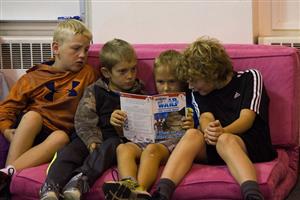-
Read Act
Minnesota Reading to Ensure Academic Development Act, known as the READ Act, was passed and signed into law by Governor Tim Walz on May 24, 2023. The goal of this legislation is to have every Minnesota child reading at or above grade level every year, beginning in kindergarten, and to support multilingual learner and students receiving special education services in achieving their individualized reading goals. The READ Act replaces Read Well by Third Grade (RWBTG) and is in effect as of July 1, 2023.
Read Well by Third Grade
 As written in MN Statute 120B.12, a school district must adopt a local literacy plan to have every child reading at or above grade level no later than the end of grade 3. A local literacy “plan must include a process to assess students' level of reading proficiency, notify and involve parents, intervene with students who are not reading at or above grade level, and identify and meet staff development needs. The district must post its literacy plan on the official school district website.
As written in MN Statute 120B.12, a school district must adopt a local literacy plan to have every child reading at or above grade level no later than the end of grade 3. A local literacy “plan must include a process to assess students' level of reading proficiency, notify and involve parents, intervene with students who are not reading at or above grade level, and identify and meet staff development needs. The district must post its literacy plan on the official school district website.Click this link to review the ISD318 2025-26 Local Literacy Plan.
Reading well by third grade is one of many developmental milestones in a child’s educational experience. Literacy development starts at an early age and is the basis for all academic success. Reading well by grade three ensures that a student has a solid foundation of literacy skills to continue to expand their understandings of what they read, create meaning, and transfer that learning across all subject areas. Instruction that provides the basis for all students to read well by third grade and beyond will help close the achievement gap and ensure that all students are ready for the demands of college and the workplace.
What is the purpose of this plan?
The purpose of this Literacy Plan is to provide an overview of how our dedicated 318 staff will continually work to improve the academic achievement of all students by identifying needs, implementing research-based instructions, engaging in on-going study and self-reflection to improve the shared practice of teaching, and involve parents and the community in a joint partnership to stay actively responsive to the needs of our children.

